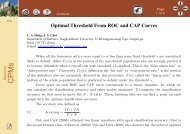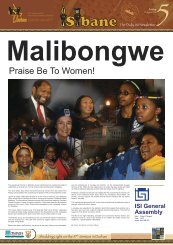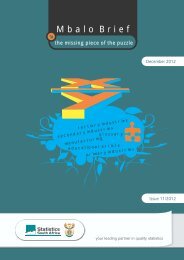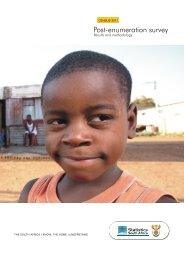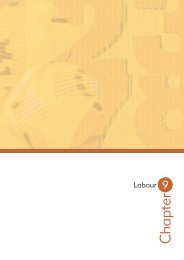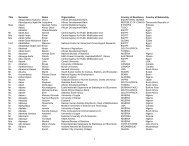General household survey - Statistics South Africa
General household survey - Statistics South Africa
General household survey - Statistics South Africa
You also want an ePaper? Increase the reach of your titles
YUMPU automatically turns print PDFs into web optimized ePapers that Google loves.
<strong>Statistics</strong> <strong>South</strong> <strong>Africa</strong> 48<br />
P0318<br />
weighting system was based on tables for the expected distribution of <strong>household</strong> heads for specific age<br />
categories, per population group and province.<br />
18.9 Sampling and the interpretation of the data<br />
Caution must be exercised when interpreting the results of the GHS at low levels of disaggregation. The<br />
sample and reporting are based on the provincial boundaries as defined in December/January 2006. These<br />
new boundaries resulted in minor changes to the boundaries of some provinces, especially Gauteng, North<br />
West, Mpumalanga/Limpopo and Eastern and Western Cape. In previous reports the sample was based<br />
on the provincial boundaries as defined in 2001, and there will therefore be slight comparative differences<br />
in terms of provincial boundary definitions.<br />
18.10 Comparability with previous <strong>survey</strong>s<br />
The revision of the GHS questionnaire in 2009 was necessary because of changing government priorities<br />
as well as weaknesses in the existing questionnaire. Unfortunately, a balance had to be struck between<br />
trying to maintain comparability over time and improving the quality of our measurements over time.<br />
The table below summarises key questions that have been included in the GHS since 2002/2003 and<br />
highlights those questions where changes may affect comparability.<br />
Table 15: Most important differences between the questionnaires used since 2009 and during<br />
preceding years<br />
GHS 2002–2008 GHS 2009–2011 Comparability<br />
Marital status Categories in GHS 2009 were moved<br />
around and single was separated into two<br />
subgroups<br />
Highest level of education Categories in 2009 have been expanded<br />
and are more detailed than before<br />
Literacy Completely different question on different<br />
Attendance of educational<br />
institutions<br />
literacy types included<br />
In GHS 2009 and 2010 the age group 0–4<br />
has its own separate section. Thus the<br />
questions about attendance are only<br />
asked for persons aged 5 years and older<br />
Categories are different from previous<br />
years<br />
Good if single categories<br />
are re-combined<br />
Good if categories are<br />
combined<br />
None<br />
Good only if in historical<br />
data the age group 0–4 is<br />
excluded<br />
Type of educational<br />
institution attended<br />
Poor for some categories<br />
Tuition fees paid More categories in the higher range were Good if categories are<br />
added<br />
combined<br />
Reasons for non-payment Categories were expanded Fair<br />
Problems experienced in<br />
educational institutions<br />
Very similar – one category added Good<br />
Disability A set of questions devised by the<br />
Washington group replaced the questions<br />
used until 2008. Each individual is asked<br />
to rate their ability to perform 6 different<br />
tasks and their inability to perform two or<br />
more of the activities, of alternatively<br />
being unable to do one renders them<br />
disabled.<br />
None<br />
Social grants Very similar GHS 2009 add general<br />
question about grant receipt. Prompt<br />
details are added next to each grant to<br />
help individuals identify each grant better<br />
Good<br />
Tenure status of dwelling Options are arranged differently and the Good, except for informal<br />
option 'owned, but not fully paid off' split in<br />
two. Rental of informal dwellings was for<br />
the first time very clearly defined to also<br />
included cases where someone owns the<br />
dwelling, but pays rent for the land on<br />
which it was erected<br />
dwellings<br />
<strong>General</strong> Household Survey, July 2011



